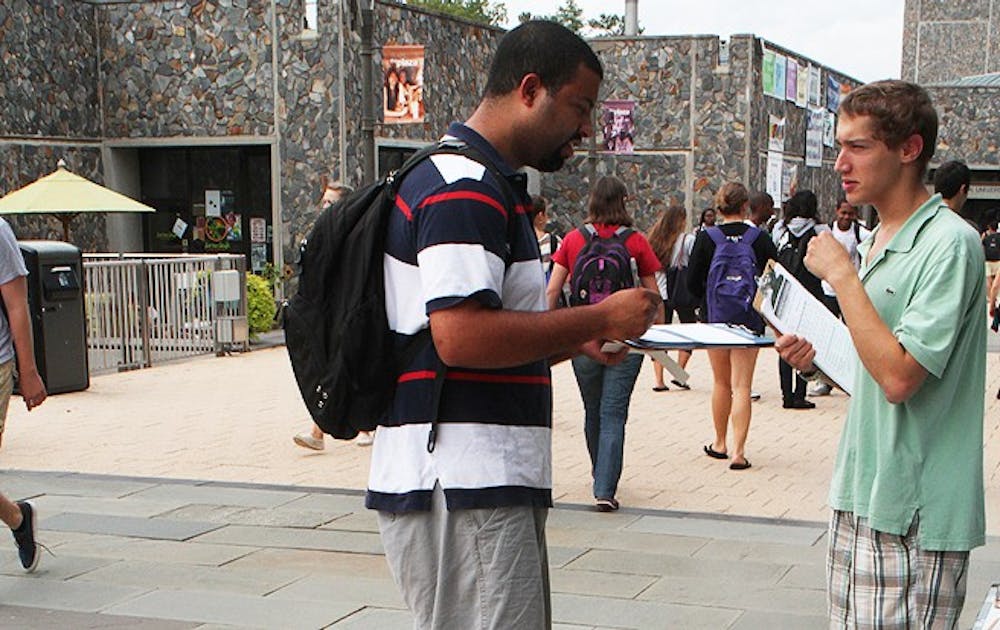With five days left to register to vote, students have redoubled their efforts to increase political activism on campus.
The push to register Duke students to vote in North Carolina has increased recently because the statewide deadline to register is 5 p.m. Friday. But students who miss the Friday deadline can still register and vote at Duke’s on-campus one-stop early voting site, which opens Oct. 18 in the Old Trinity Room. Voting is an important way of shaping the country, especially for college students in North Carolina—a swing state—where they stand to greatly influence the elections, said state Sen. Floyd McKissick, D-Durham.
“People think that one vote doesn’t make a difference, but it can,” McKissick said. “If you’re on campus for four years, you’re a stakeholder in that state and that community. We can’t allow people to get complacent.”
Because college students tend to be more liberal, McKissick said voter participation on college campuses could swing the election either way, especially in North Carolina where the race will be very close.
State Rep. David Lewis, R-Harnett, added that the left-leaning college student population has helped tilt the Durham and Chapel Hill areas more in favor of Democrats.
In 2008, President Barack Obama won the state by a narrow margin of approximately 14,000 votes.
The difference, which is fewer than the number of students enrolled at Duke, is a reason why Duke students should register and vote in North Carolina, said sophomore David Winegar, president of Duke Democrats.
“We really have the ability to swing the elections here at Duke,” Winegar said.
Students vote in North Carolina to connect more with the Durham community, junior Grace Benson said. Voting in North Carolina means learning about political and social issues in the area, which is important for Duke students who are members of the Durham community, she added.
“I decided to register to vote in North Carolina because it is my home for nine months out of the year,” Benson said. “It is a vital step in participating in our new community.”
But some students plan to vote via absentee ballots in their home states. Sarah Bartleson, a senior from Florida, said her absentee ballot should be arriving in the mail within the next few days. She plans to vote in Florida because a referendum on the ballot in her hometown allowing residents to own pickup trucks could benefit her family, she added. Florida is also a battleground state for the presidential race, she noted.
“You’re voting for the presidential elections either way, but there are local issues that are important as well,” she said. “The election is not just about the president.”
Whether students vote in North Carolina or at home depends on their level of interest, Lewis noted. If they are primarily interested in the presidential race, then it does not matter where they vote. But controversial local issues—such as the Amendment One referendum on the spring ballot—could encourage students to become engaged and therefore influence where they vote.
Ultimately, it is up to the student to decide where to vote, as long as they follow the law and do not vote in multiple states, Lewis said.
“The right to vote and the care to participate in the process far outweighs any political preferences of mine,” he added.
Bartleson added that more freshmen—who may not yet feel connected to North Carolina—tend to vote absentee more often than upperclassmen. Many students are also influenced by their parents’ political opinions and therefore vote for the same candidates and in the same states.
Duke Student Government President Alex Swain, a senior, noted the University’s mission of civic engagement in highlighting the importance of political activism. She applauded students who actively participate in campaigns by interning and volunteering, adding that all students can become involved by voting.
“Voting is one of the best ways to be civically engaged,” Swain said. “Having an on-campus voting site makes it easier for people to be engaged.”
Get The Chronicle straight to your inbox
Signup for our weekly newsletter. Cancel at any time.

